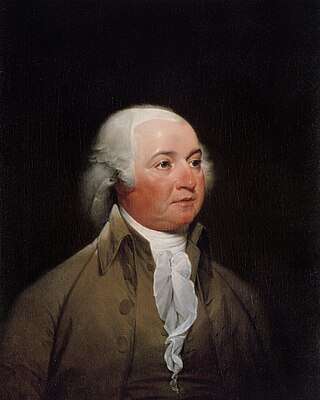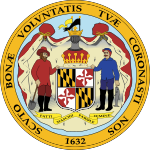
The Twelfth Amendment to the United States Constitution provides the procedure for electing the president and vice president. It replaced the procedure in Article II, Section 1, Clause 3, under which the Electoral College originally functioned. The amendment was proposed by Congress on December 9, 1803, and was ratified by the requisite three-fourths of state legislatures on June 15, 1804. The new rules took effect for the 1804 presidential election and have governed all subsequent presidential elections.

The 1788–89 United States presidential election was the first quadrennial presidential election. It was held from Monday, December 15, 1788, to Wednesday, January 7, 1789, under the new Constitution ratified that same year. George Washington was unanimously elected for the first of his two terms as president and John Adams became the first vice president. This was the only U.S. presidential election that spanned two calendar years without a contingent election and the first national presidential election in American history.

The 1792 United States presidential election was the second quadrennial presidential election. It was held from Friday, November 2, to Wednesday, December 5, 1792. Incumbent President George Washington was elected to a second term by a unanimous vote in the electoral college, while John Adams was re-elected as vice president. Washington was essentially unopposed, but Adams faced a competitive re-election against Governor George Clinton of New York.

The 1796 United States presidential election was the third quadrennial presidential election of the United States. It was held from Friday, November 4 to Wednesday, December 7, 1796. It was the first contested American presidential election, the first presidential election in which political parties played a dominant role, and the only presidential election in which a president and vice president were elected from opposing tickets. Incumbent vice president John Adams of the Federalist Party defeated former secretary of state Thomas Jefferson of the Democratic-Republican Party.

The 1816 United States presidential election was the eighth quadrennial presidential election. It was held from November 1 to December 4, 1816. In the first election following the end of the War of 1812, Democratic-Republican candidate James Monroe defeated Federalist Rufus King. The election was the last in which the Federalist Party fielded a presidential candidate.

In the United States, the Electoral College is the group of presidential electors that is formed every four years for the sole purpose of voting for the president and vice president. The process is described in Article II of the U.S. Constitution. Each state appoints electors using legal procedures determined by its legislature, equal in number to its congressional delegation totaling 535 electors. A 1961 amendment granted the federal District of Columbia three electors. Of the current 538 electors, a simple majority of 270 or more electoral votes is required to elect the president and vice president. If no candidate achieves a majority there, a contingent election is held by the House of Representatives to elect the president and by the Senate to elect the vice president. Federal office holders, including senators and representatives, cannot be electors.

The 2004 United States presidential election in Maryland took place on November 2, 2004, and was part of the 2004 United States presidential election. Voters chose 10 representatives, or electors to the Electoral College, who voted for president and vice president.

The 2008 United States presidential election in Maryland took place on November 4, 2008, and was part of the 2008 United States presidential election. Voters chose 10 representatives, or electors to the Electoral College, who voted for president and vice president.

The election of the president and the vice president of the United States is an indirect election in which citizens of the United States who are registered to vote in one of the fifty U.S. states or in Washington, D.C., cast ballots not directly for those offices, but instead for members of the Electoral College. These electors then cast direct votes, known as electoral votes, for president, and for vice president. The candidate who receives an absolute majority of electoral votes is then elected to that office. If no candidate receives an absolute majority of the votes for president, the House of Representatives elects the president; likewise if no one receives an absolute majority of the votes for vice president, then the Senate elects the vice president.

The 2000 United States presidential election in Maryland took place on November 7, 2000. Maryland participated in the 2000 United States presidential election along with the 49 other U.S. states and Washington, D.C. Voters chose 10 representatives, or electors, to the Electoral College, who voted for the President and Vice President.

The 1824 United States presidential election in Maryland took place between October 26 and December 2, 1824, as part of the 1824 United States presidential election. Voters chose 11 representatives, or electors to the Electoral College, who voted for President and Vice President.
In the United States, a contingent election is used to elect the president or vice president if no candidate receives a majority of the whole number of Electors appointed. A presidential contingent election is decided by a special vote of the United States House of Representatives, while a vice-presidential contingent election is decided by a vote of the United States Senate. During a contingent election in the House, each state delegation votes en bloc to choose the president instead of representatives voting individually. Senators, by contrast, cast votes individually for vice president.

The 1792 United States presidential election in Maryland took place on an unknown date in 1792, as part of the 1792 presidential election. Voters chose eight representatives, or electors to the Electoral College, who voted for President and Vice President.

The 1796 United States presidential election in Maryland took place on an unknown date in 1796, as part of the 1796 presidential election. Voters chose ten representatives, or electors to the Electoral College, who voted for President and Vice President.

The 1800 United States presidential election in Maryland took place on an unknown date in 1800, as part of the 1800 presidential election. Voters chose ten representatives, or electors to the Electoral College, who voted for President and Vice President.

Voting in Maryland for the 1808 United States presidential election took place on an unknown date. Voters chose eleven representatives, or electors to the Electoral College, who voted for President and Vice President.

The 1812 United States presidential election in Maryland took place on an unknown date in 1812, as part of the 1812 presidential election. Voters chose eleven representatives, or electors to the Electoral College, who voted for President and Vice President.

The 1816 United States presidential election in Maryland took place on an unknown date in 1816, as part of the 1816 presidential election. Voters chose eleven representatives, or electors to the Electoral College, who voted for President and Vice President.

The 1820 United States presidential election in Maryland took place on an unknown date in 1820, as part of the 1820 presidential election. Voters chose eleven representatives, or electors to the Electoral College, who voted for President and Vice President.

















